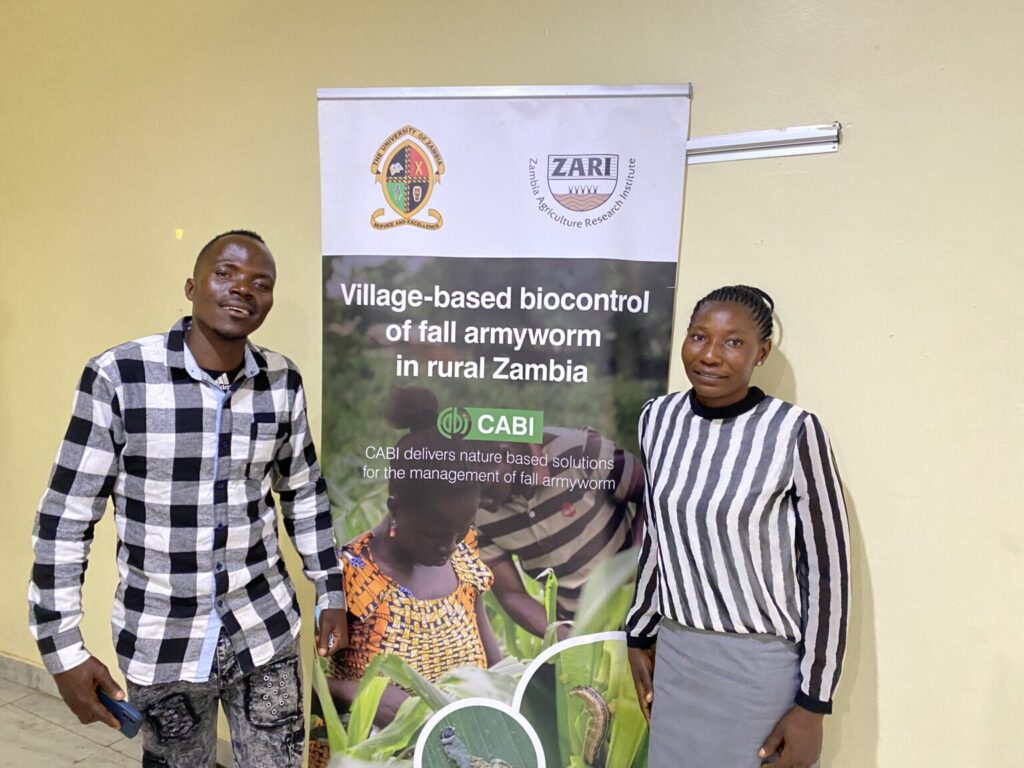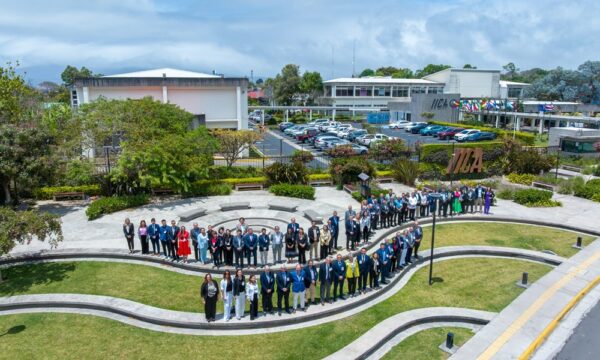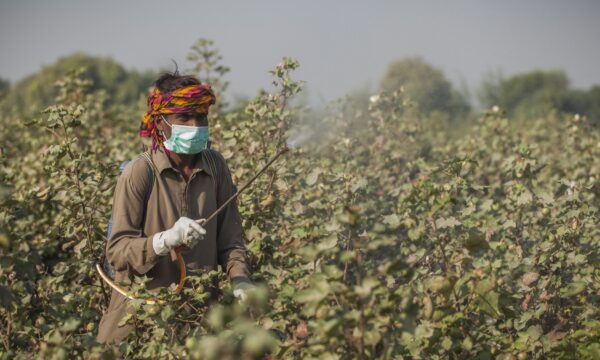
This year’s Africa Food Systems Summit 2025, in Dakar, Senegal, focuses on Africa’s youth and how they can lead collaboration, innovation, and the implementation of agri-food systems transformation for a stronger and more resilient food value chain.
It is estimated that some 500 million smallholder farmers around the world produce around 35-46 percent of the world’s food to help feed just over 8 billion people living on our fragile planet.
Smallholder farmers are crucial for global food security. But how can their agricultural practices be more sustainable and safer, reducing contamination of food and feed with mycotoxins and pesticide residues? How can they protect themselves and the environment from pesticide risks? How can young people drive transformation? Dr Dennis Rangi, Director General – Development, CABI, explores further.
Risks to humans, livestock and the environment
Aflatoxins are poisonous carcinogens, primarily linked to liver cancer in humans and causing reduced milk production, impaired reproduction, and liver disease in livestock.
Chemical pesticides contaminate water, soil, and air, causing biodiversity loss, harming aquatic ecosystems through algal blooms and fish kills, and can be transferred through the food chain.
In humans, pesticide exposure is linked to chronic illnesses, including cancer and neurological diseases, while occupational exposure poses risks to farm and abattoir workers.
Clearly, we need to be aware of broader risks for livestock and ecosystems as well as humans if we are to have safe and sustainable agricultural production.
Youth and women are key players in the future of agriculture
I believe that our young men and women of all ages are key players in the future of agriculture where the challenges to safe production of food must be overcome if we are to reduce the associated significant health burdens.
At the same time economic losses from lost export trade and reduced competitiveness in the agri-food sector occur. To address these challenges we need improved policy, capacity building, technology implementation and robust coordination between agriculture, health, environment and trade sectors.
In essence a One Health approach is needed whereby a collaborative framework recognises the interconnectedness of human, animal, plant, and ecosystem health to prevent and manage foodborne risks.
One Health approach involves collaboration across sectors and development of multi-sector strategies to ensure safe food from production to consumption.
We recognise the real-life situation of the farmer
We must recognise the real-life situation of the farmer who is faced with having to understand which pesticide to use, how to use it on their crop, and how to apply it safely with reduced risk to their own health. This includes the use of correct Personal Protective Equipment (PPE).
Furthermore, we must respect the major challenge they face in that the low-risk products are sometimes not economically viable. Farmers use so called ‘nasty chemicals’ to ensure they have produce to sell at a cost that allows them to make a profit.
As demand for food grows globally, farming practices must intensify, and pest increases are expected. However, while pesticides are an important tool for pest management, they should be seen as part of a kit of many tools, not the only tool. More low-risk tools are needed to tackle plant pests and diseases and the enabling environment set to provide economic incentives.
Careful pesticide usage safeguards our food safety
Careful pesticide usage safeguards our food safety and security today and in the future. As a result of using fewer pesticides, we are also protecting soil and water. We are also conserving biodiversity including beneficial insects like pollinators.
Back in July 2023, the CABI-led PlantwisePlus programme in partnership with the Centre for Behaviour Change and Communication (CBCC) and the Department of Agriculture, Nakuru County, in Kenya, launched the Ukulima True Social and Behaviour Change initiative.
This collaboration focused on pesticide risk reduction in Nakuru County – one of Kenya’s biggest for fruit and vegetable production. The initiative sought to address the unsafe use of pesticides including the unapproved or wrong types of products.
It also stressed the importance of farmers using the right kind of PPE and the safe spraying of pesticides. It is essential that we have more initiatives like Ukulima True to help ensure greater food safety and security through pesticide risk reduction.
Ukulima True recognised that messaging farmers alone was unlikely to make a difference. CABI engaged with many others, such as agrodealers, traders, community elders and young men and women to share the messaging more widely and to create champions.
Practices that help foster Integrated Pest Management

Young men and women are part of the solution young agro-input suppliers and microbusinesses engaging in practices that help foster Integrated Pest Management (IPM) where biological control solutions for pest and disease control can be used alongside chemical pesticides.
PlantwisePlus has been working with youth in Kenya and Uganda – teaching them how to set up micro-businesses to provide services to farmers including advice about pests and how to manage them; safe application of crop protection products and supplying essential agricultural inputs to farmers in their communities (e.g. biological products, seeds, fertilizers, PPEs and some pesticides. Training in proper pesticide application and choice of appropriate products means they can help reduce pesticide risk.
Meanwhile, CABI together with the Zambia Agriculture Research Institute (ZARI) and the University of Zambia (UNZA) implemented a project, funded by the Australian Centre for International Agricultural Research (ACIAR), to advocate village-based biological control of fall armyworm in Zambia.
This project has helped equip young farmers with the skills and insights necessary to establish businesses in the production, distribution and sale of biological control solutions to fall armyworm. This marks a significant step towards promoting sustainable agribusiness ventures among the youth.
Crucial role women and youth play in agriculture
In conclusion, we need to recognise the crucial role women and youth play in agriculture. Kadzamira et al (2024) in the CABI Agriculture & Bioscience journal, for instance, said “Africa’s women and youth hold the key to the continent’s very survival and the burden to sustain wider global development.”
But the researchers found that they remain on “the periphery of decision-making processes, having limited control over productive resources and are predominantly engaged in low paying and/or non-remunerated roles within the sector.”
I agree with the researchers when they say that for “sustained and effective engagement of women and young people in agricultural service provision, there is need for multi-sectoral inter-institutional collaboration.”
There is a need for long-term dedicated funding from governments and development partners to strengthen the capacity of women and young to contribute more towards greater sustainable, safer and secure smallholder farming to feed our growing world.
Additional information
Main image: The Ukulima True initiative addressed the importance of farmers using the right kind of Personal Protective Equipment (PPE) and the safe spraying of pesticides (Credit: CABI).
Dr Dennis Rangi, Director General – Development, CABI

Dr Rangi has over 30 years of experience in development cooperation including management of scientific research & implementation. He has fulfilled several assignments in developing countries and has a strong understanding of their circumstances and needs.
Related News & Blogs
CABI highlights its expertise at Africa Food Systems Forum on the benefits of sharing data for agriculture
CABI has highlighted its expertise in digital development by taking part in the Africa Food Systems Forum (AFSF) in Senegal where it outlined how sharing data through regional platforms can help different agricultural services work better together. The…
15 September 2025





